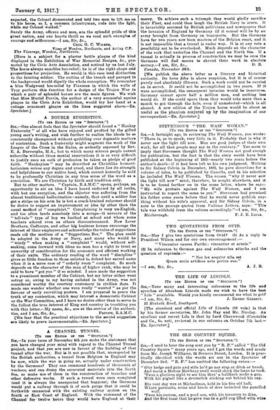A DOUBLE SUGGESTION.
(To me EDITOR. or THE " SPECTATOR.")
Sia,—One almost feels that the Spectator should found a " Hankey Fraternity " of all who have enjoyed and profited by the gifted young seer's writing, and wish further to realize the ideals he so consistently championed without quibbling over dogmatic matters of contention. Such a fraternity might augment the work of the League of the Cross in the Ruins, so ardently espoused by Rev. E. A. Burroughs, M.A., but to which many sincere people cannot subscribe without those mental reservations it is so very difficult to justify once an oath of profession be taken as pledge of good faith. " Hankeyism " may be described as Christlike humani- tarianism minus any dogma and creed, and there lies its strength and helpfulness to our native land, which cannot honestly be said to be professedly Christian in any true sense of the word as a conviction. We are Christian by birth and tradition only. But to other matters. " Captain, R.A.M.C." opens, perhaps, an opportunity to air an idea I have heard endorsed by all ranks, with but one exception, and the objector was suffering from the almost traditional hallucination—namely, that until a soldier has got a stripe on his arm he is but a crack-brained reformer should he desire to suggest an improvement or idea by other than the usual method of " complaint." Complaining is very un-English, and too often lands somebody into a scrape—it savours of the
" " type of boy we loathed at school and whom some teachers adored even as others discountenanced. Now Lever Brothers, Cadburys, and other big business houses encourage the interest of their employees and acknowledge the value of suggestions made via the medium of a " Suggestions Box." The plan could be adopted in the Army or Navy, and many who would be " windy " when making a " complaint " would, without self- seeking, come forward with ideas no man has a right to treat as unworthy of consideration for the economic and efficient working of their units. The ordinary reading of the word " discipline " gives so little freedom to those enlisted to defend her sacred name when it is a mere case of " orderly room " complaint. So much depends on the character of the man of higher rank, who may be said to have " got you " if so minded. I once made the suggestion to a prominent member of the Cabinet, but my letter either went astray or, owing to my having enlisted in the Army, was not considered worthy the courtesy customary in civilian days. It made one wonder whether one were really " wanted " as per the fervour of early recruiting posters. I am prepared to prove the truth of my contention, which may interest a democratic Cabinet or the War Committee, and I have no desire other than to serve to the fullest the true interest of sing and country in troubling you with this letter.—My name, &c., are at the service of the authori- ties, and I am, Sir, &c., PRIVATE, R.A.M.C. [We fear that the practical objections to the second suggestion are likely to prove insurmountable.—En. Spectator.]










































 Previous page
Previous page